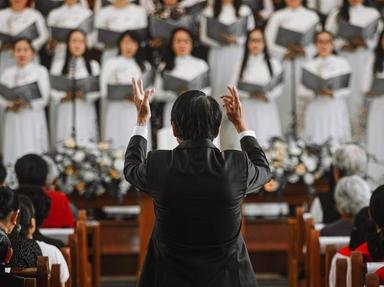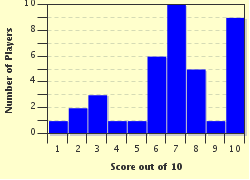Quiz Answer Key and Fun Facts
1. James Weldon Johnson was a diplomat, civil rights leader, lawyer and poet as well as the writer of the hymn 'Lift Every Voice and Sing'. Johnson was born in Jacksonville and was the first African-American to be admitted to the bar in his state. In what state did he serve as a lawyer?
2. Samuel Davies was president of the College of New Jersey from 1759 to 1761 and wrote the hymn 'Great God of Wonders'. The College of New Jersey evolved into a Ivy League university with its sporting teams called the Tigers. What's the name of the university?
3. Robert Grant (1778-1838) was a lawyer and politician in Great Britain who wrote the modern version of the hymn 'O Worship the King'. This even though he was born in a country known today as the largest democracy in terms of population in the world. What country was Grant born in?
4. John Edgar Park, president of Wheaton College from 1926 to 1944, wrote the hymn 'We Would See Jesus'. Where is Wheaton College?
5. The hymn 'Morning Red' was written by Rossiter W. Raymond (1840-1918). Raymond, a novelist and government official, was born in an American city for which notorious TV host Jerry Springer served as mayor. In what city was he born?
6. The famous Christmas carol 'While Shepherds Watched Their Flocks' was written by playwright and poet laureate Nahum Tate (1652-1715). What are the missing words in the third line of Verse 1 of the carol?
"While shepherds watched their flocks by night,
All seated on the ground,
The angel of the Lord __________,
And glory shone around,
And glory shone around."
7. Thomas Moore (1779-1852) was an Irish nationalist, singer and entertainer who wrote the hymn 'Come, Ye Disconsolate'. Moore was born in the largest city in Ireland, or Eire. What's the name of the city?
8. James Russell Lowell (1819-1891) was an an American ambassador, lawyer, author and poet who wrote the hymn 'Once to Every Man and Nation'. He became professor of modern languages and literature, replacing Henry Wadsworth Longfellow in 1855, at a university known for the nickname Crimson. What is the name of the school?
9. John Dryden was an English poet, literary critic, translator, and playwright who was made Poet Laureate in 1668. He translated the hymn 'Come, Creator Spirit, by Whose Aid' from Latin to English. Dryden was born 236 years before Canadian confederation. What year was he born?
10. The man who wrote the hymn 'He Who Would Valiant Be' also wrote a large number of essays and books, including 'The Pilgrim's Progress'. What is the man's name?
Source: Author
Cowrofl
This quiz was reviewed by FunTrivia editor
agony before going online.
Any errors found in FunTrivia content are routinely corrected through our feedback system.

